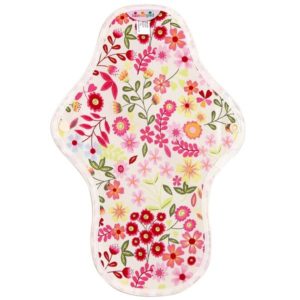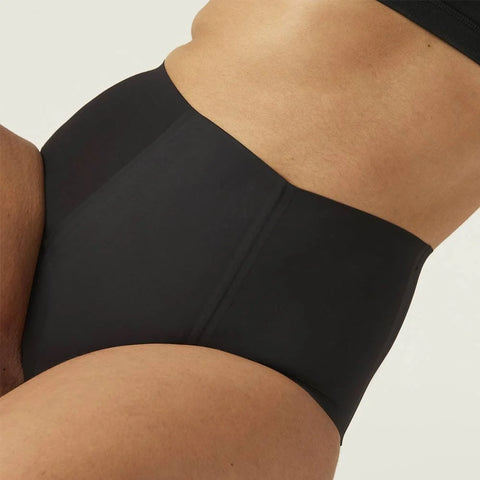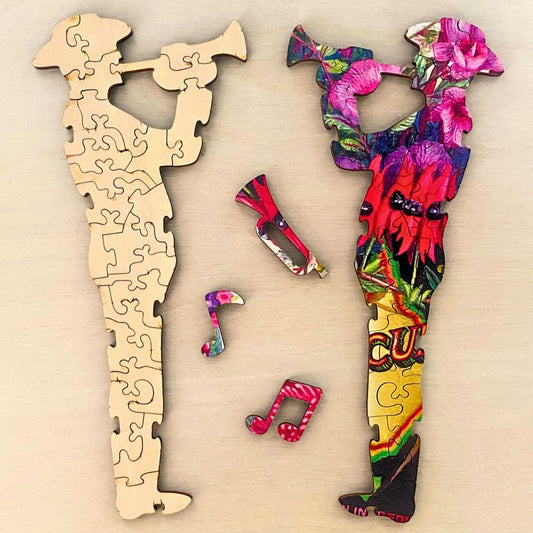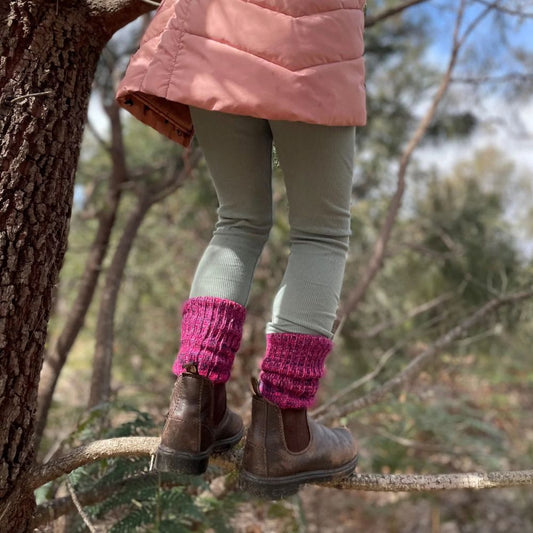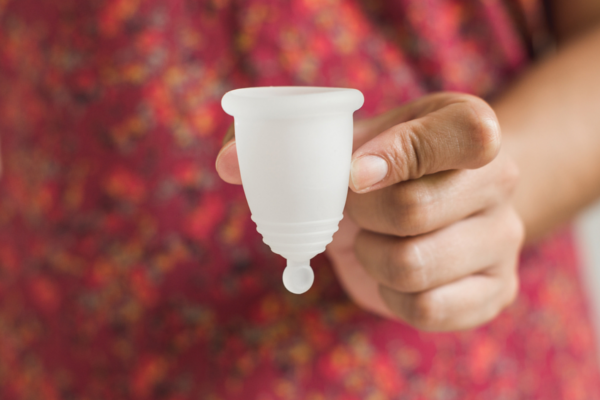
With all the sanitary items, wrappings, packaging and applicators, your period is even less enjoyable due to all the waste it creates! The good thing is, you can have a less waste or a zero waste period. In fact, reusable cloth pads and period underwear are also ideal for those with incontinence, during and after pregnancy, or going through menopause.
With an easy swap to a more sustainable option, you can live your period days like you usually would, but knowing you're also helping the environment and not contributing to landfill. So, what are these zero waste period products?
1. Zero Waste Period Pads
A great alternative to single-use disposable pads, reusable cloth period pads are made from absorbent natural cotton, and rely on clips and buttons for fastening rather than chemical adhesives. Being made of cloth and organic cotton, they are completely free of all the plastics a regular pad contains. This also means they're particularly good for people with sensitive skin.
If you care for your reusable cloth pads, they'll last you two to three years, at least. Not only does that prevent hundreds of sanitary items from going to landfill each year, you will potentially save lots of money too.
How to Care for a Zero Waste Period Pad
- Once you change your pad, rinse the used pad under cold water.
- Lather any natural laundry detergent.
- Soak in cold water for a minimum of 6 hours to overnight (up to 48 hours if required, changing water daily).
- For tough stains, use a natural stain remover or soak in Oxygen Bleach
- Hand wash or machine wash.
- Dry inside or outside, in the sun where possible as this will help reduce staining.
On the go, pop your used cloth pad in a wet bag (a small bag lined with waterproof fabric) and do these steps when you get home. Simple! And no need to make landfill waste. You can use cloth pads by themselves or in conjunction with a menstrual cup, or for other occurrences like discharge, postpartum bleeding, or light bladder leakage.
Find all our wet bag choices
Shop Reusable Cloth Pads
Hannahpad Period Pads and Panty Liners – certified organic cotton that is chemical-free, unbleached, and non-dyed, with a waterproof backing to prevent leaks.
Juju zero waste cloth pads are also made from organic cotton and contain no fragrances, formaldehyde, dioxins or absorption agents that often cause irritation
Shop Hannahpad and Juju zero waste cloth pads here >
2. Menstrual Cups
We've seen a surge in interest in another excellent zero waste period product, menstrual cups. They are incredibly long lasting, and if inserted correctly, it is a leak-free solution that is easy-to-use and safe for your body.
Official menstrual cups are made with medical-grade silicone, which is hypoallergenic and latex free, and doesn't alter the body's natural moisture level. It can also be used at night-time, for a maximum of 12 hours.
Incredibly cost effective, one cup can last for 10 years with proper care, meaning you will not only reduce the amount of waste ending up in landfill, you will save a a lot of money too.
How to Use a Zero Waste Menstrual Cup
- It takes time to learn to use the menstruation cup, but some women succeed right away. Please read the comprehensive instructions sent with the cup carefully.
- Sterilise the cup in water according to instructions provided. The cup should be in boiling water for at least 2 minutes.
- With washed hands, fold the cup in half, and then in half again.
- Guide the folded end into the vagina past the pubic bone and then allow to pop open fully.
- To remove, break the seal by squeezing the bottom part of the cup, hold upright to avoid spilling the contents.
- Never pull the cup down in an open position, holding it only by the tab. You have to squeeze.
- Rinse the cup in cold water, then wash carefully in hot water with natural, mild and perfume-free washing liquid or soap, and re-insert it. From time to time it is okay to wipe the cup with toilet paper.
- Wash the menstrual cup carefully after its last use during your period and store it, properly ventilated, in its own menstrual care products storage bag.
By following these steps, and with good care, your menstrual cup will last for years, helping you save lots of waste ending up in landfill. Menstrual cups come in different sizes, so you'll need to pick the right one for you.
If you are over 35 or have had a vaginal delivery, then size 2 is probably the better choice.
Otherwise, you would use size 1.
A high or low cervix will also determine what size would suit you best - a high cervix generally needs a longer cup and vice versa.
Please note: Menstrual cups cannot be used for post-natal bleeding due to vaginal inflammation from childbirth.
3. Zero Waste Period Underwear
Zero waste period underwear is a type of underwear that can absorb menstrual blood and replace disposable pads or tampons. It is made from natural and breathable fabrics that have multiple layers of absorbency and leak protection.
Zero waste period underwear is a great way to reduce the environmental impact of your period and save money on menstrual products.
Disposable pads and tampons often contain chemicals like phthalates, parabens, bisphenols, or triclocarban, whereas zero waste period underwear does not. Be sure to look for period underwear that states it is free from PFAS also.
Zero waste period underwear comes in different styles, sizes, colors, and absorbencies to suit your needs and preferences. You’ll love the convenience and confidence that zero waste period underwear provides.
Shop the original Modibodi
How to Use Period Underwear
To use zero waste period underwear, you simply wear it like regular underwear during your period. Depending on your flow and preference, you can wear it alone or with a menstrual cup for extra protection. You can wear one pair for up to 12 hours or change more frequently if needed.
To wash, just rinse it with cold water and toss it in the washing machine with your regular laundry. Learn more here about How To Wash Modibodi
A Note About Tampons
If you still prefer to wear a tampon, natural organic tampons are the best option. The tampons that we sell at Biome are made from Certified Organic cotton, and are free from bleaches, chlorine, coatings, pesticides and perfumes commonly found in tampons. You also avoid the chemical Dioxin, a chlorine-bleaching by-product that's also a toxic carcinogen. Now you may be thinking: tampons still go in landfill, right? Even if they're organic? The answer is no! As our tampons are completely natural, they're biodegradable! Just make sure to break it up, like cutting it up with scissors, and placed them in a closed, effective compost; they take a while to break down.
Choose What You Feel Most Comfortable With
No matter what alternative you choose to use, you can have a zero waste period. Hopefully by choosing zero waste period products and creating less rubbish and more environmental good you'll end up liking your periods a little bit more!
MORE READING
How to Choose the Right Size Menstrual Cup Size for You
Five Reasons to Consider Choosing a Menstrual Cup
Your Top Menstrual Product Questions Answered

